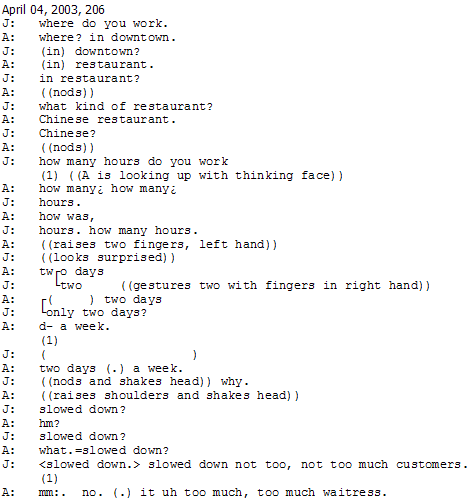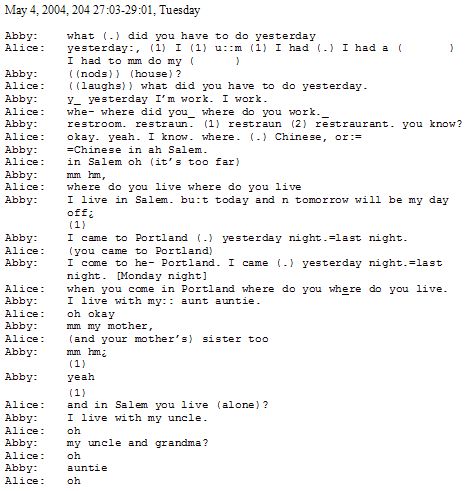Like many immigrant learners, in 2003, Abby reported that her reason for studying English was to get a job. She did so in December 2002, bussing tables at a local restaurant. By April of 2003, she was a server at the same restaurant.
Abby had worked in China as a retailer for one year before coming to the U.S. When asked about a status difference between her work in China and her work in the U.S., Abby reported that she felt better about work in the U.S because the hours are shorter and she earns more money.
She did express in several contexts, however, that she was interested in improving her English language skills so that she could get a better job, for example, at a "company owned by an American". Four years after arriving in the U.S., Abby implies that her jobs in Chinese restaurants might be keeping her from acculturating more fully into U.S. society. She discussed being bored much of the time in the U.S. - reporting that her life consists of working, studying, and returning home. She lamented that she has fewer friends here than in China.
Like other immigrant-learners of English, having a job can be a context where English develops. But often the learners are in situations where a majority of their co-workers speak a language other than English. In Abby's case, the language that the majority of her co-workers speak is her first language, Cantonese. While there are opportunities for Abby to use English at work, these are limited to speaking to the bartenders and to customers. She reports that she does learn some English through speaking with the bartenders but that her talk with the customers is not helpful for her English language learning because of the limits of that genre.
Such a situation is something of a Catch 22 for immigrant learners. They report a wish to improve their English so that they can get a better job, but because they must work to support themselves, are in jobs where the dominant language is their.
In class from Abby's third term at the Lab School (April, 2003), in a spontaneous conversation that starts between Jose and Abby, they discuss work. In this excerpt, we see how learning the lexicon of English is heavily contextualized and how work is an important part of that context. When Jose uses the phrase "slowed down" for a possible reason for Abby's few hours of work, she does not understand what he means, but after Jose repeats the phrase and explains "not too much customers" Abby understands and gives an alternative explanation "too much waitress".
| (Click to View) (Requires Internet Explorer). | |
 | |
| Hide Conversation |
In the following interaction with Alice from Abby's sixth term of study at the Lab School, Alice asks Abby about her work and living situation. We see that Abby works and lives in Salem, Oregon part of the week and in Portland part of the week. She leaves Salem on Monday night and goes back to Salem on Thursday evening. She spends Monday night through Thursday morning in Portland where she takes classes on Tuesday and Thursday mornings. This situation is facilitated, in part, by her family support.
| (Click to View) (Requires Internet Explorer). | |
 | |
| Hide Conversation |
Work also serves as an interesting site for ethnic-national identity construction in the classroom. We have seen instances in which learners (not in our study) make assumptions (mistaken) about a peer's workplace being a restaurant. When students report working in a restaurant, we see students make assumptions about the ‘ethnicity' of the restaurant based on the student's ethnicity. Above, we see Alice use her ascribed identity of Abby, inferring that because she is from China that she works at a Chinese restaurant.
